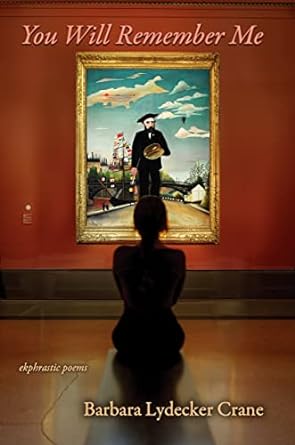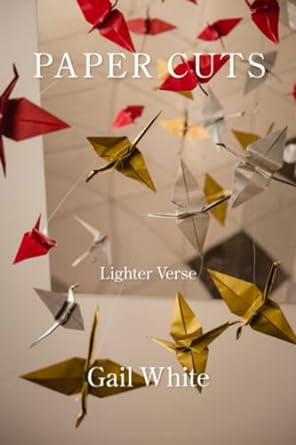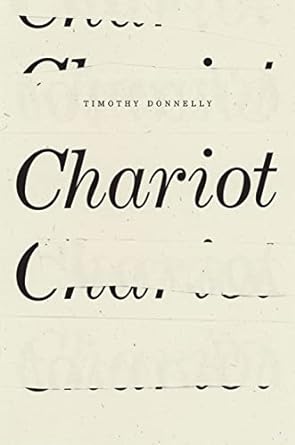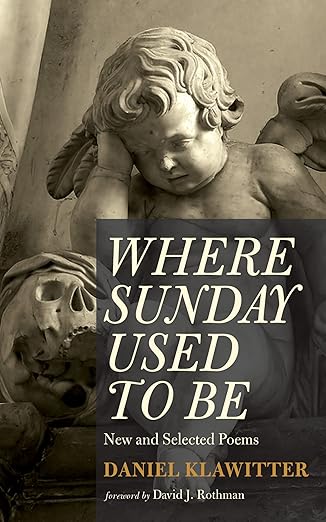If you have a book you’d like considered for a review in Light—one that includes a large helping of comic verse and was published within the previous 12 months, or will be published in the next eight—please send a copy to:
Barbara Loots
4741 Central St.
Ste. 601
Kansas City, MO 64112
(Pre-print-run electronic copies may be sent to lightpoetryreviews@gmail.com)
Light on Their Feet
Reviews of books by Barbara Lydecker Crane, Timothy Donnelly, Daniel Klawitter, and Gail White
by Barbara Egel
Reviewer’s note:
Dearest friends, my audience for eight years, I’m going to miss you. This is my last set of reviews for Light, as I have morphed somehow into an academic administrator. (Congratulation and commiseration equally accepted.) I’m eager to take on this new adventure, but it’s definitely going to eat large chunks of my time for the next couple of years, and I don’t want to write for you if I can’t be sure it will be my best effort. Therefore, I’ve told Melissa and the crew that I’m stepping down.
To the poets: Thank you for the laughs, the snorts, the groans, and the occasional WTF? moments. It was such a delightful experience seeing both familiar names and new ones as I stood in the Uptown post office ripping open packages, too greedy to wait until I got home. I so appreciate how each of you expanded my definition of what light verse can be.
To the readers: Thank you for being such a patient audience as you suffered through my groaners and obscurities (the ones that slipped by; Melissa catches most of them). Thanks for submitting yourselves to my biannual blithering and for being so smart about poetry and the world in general that I got smarter in writing for you.
To Melissa: Your patience deserves a poem of its own (a multivolume ode, really), and your wise and hilarious notes have made me better at a whole bunch of writerly and poetic stuff. I will miss our conversations in the Track Changes notes more than you can imagine.
To my successor, Barbara Loots: You are going to have SO MUCH FUN. You are absolutely going to crush this in the best way. I’m eager to get to know your voice as a critic and to see what comes to you from your (hopefully more efficient) PO in MO.
Okay, I’ll stop being soppy and get to the books. My first review for Light was my longest, and my last will be the shortest because I still have to figure out the difference between a senior associate dean and an assistant vice provost.
You Will Remember Me, by Barbara Lydecker Crane. Word Galaxy Press (an imprint of Able Muse), 2023.
Before I get into all the ways Barbara Lydecker Crane is still/again/always impressive, I want to give a huge shoutout to Alex Pepple and Word Galaxy Press. This book is a beautiful object, and it achieves a level of quality and sophistication that most small presses don’t even attempt. I don’t know how he’s done it, but congratulations to Alex on a gorgeous artifact.
So what could I possibly be talking about? Aren’t poetry books just black type on white pages? Oh, my friends, not this time. Crane has composed a book of sonnets, each written from the perspective of a portrait painter. The added magic is that her publisher has found a way to include almost all the pictures in the book in color. With a few exceptions (because of copyright issues), we can see the paintings Crane scrutinizes—by everyone from Botticelli to Botero—as we read the poems. The experience of ekphrastic poetry usually involves a lot of Googling and flipping from screen to page and back. It’s hard to explain why not having to do that is so special, but it truly is. Perhaps it’s that I knew I was looking at exactly the same thing the poet was as she wrote. Perhaps it’s being able to disconnect, go back in time to the painters and their work, and not involve any digital intervention.
But you’re here to hear about the poems, which are fresh and insightful and, of course, masterfully made. In an Afterword, Crane calls the pieces in the book “historical fiction,” part research and part imagination, limning the artist’s attitude, mood, and motivation for the work. Some of the portraits are quite famous, like “Girl With a Pearl Earring,” and others less so, but Crane’s skill makes them unforgettable once you’ve met them. The intimacy of portraiture lends itself beautifully to the brevity and rhetoric of the sonnet, and a number of the paintings are self-portraits, which confounds distinctions between the gaze and its object. Polish artist Aniela Pajakowna’s “Self-Portrait with Daughter” shows a little girl with a steady gaze standing in front of her mother, who looks beset by care. In Crane’s poem, the painter describes the difficulties of raising a much-loved, though illegitimate, child in 19th century Europe, “painting the worry in my shadowed eyes.” In other poems, Crane speculates on the self-delusions of various artists—Van Gogh, for instance, while he was in a French asylum. The heartbreaking sonnet “My Present” (named for a self-portrait he painted at the asylum) takes the form of a letter from the artist to his mother. It reads in part, “I’m hoping that quite soon I will walk out, / restored to health and almost free of doubt.”
Crane, who had a long career as a professional artist, is especially good at capturing the dailiness of the job of art. Financial need is at the root of several commissioned works in the book, and Crane’s takes on the private thoughts of the artists often expose the little insults painted into the works. Holbein’s portrait of Henry VIII is just obsequious enough not to attract attention, but as much as the outward trappings of royalty shine, “I’ve not adorned the plunder of his face: / his tiny mouth, his cheeks like risen dough, / his weasel eyes.” Similarly, Gainsborough paints an “unspoken dressing down” into his portrait of a wealthy couple who have land and money but apparently zero tact or warmth. Yet paint he must because “my father owed / a debt to hers.”
The sonnets themselves are as beautifully made as the book. In many of them, Crane uses the couplet not to conclude the idea in the poem but to open a new one. “Portrait of a Lady,” for example, channels 16th-century Belgian artist Catharina van Hemmesen. The octave describes the plain but pleasant woman on the canvas. The sestet compares the woman to the painter and then ends with a devastating pair of lines that shift the whole story as it’s been told so far:
Of modest means, without a comely face,
this woman faced the choice that I would, too.
At twenty-six I looked at my position:
although my art had earned me recognition,
I put aside my paints and I withdrew
to wed. What made me close the door to fame
was fervent hope for children. They never came.
This poem points to another generous gift Crane gives us. A number of women painters are featured in the book; some of them, like Morisot and Gentileschi, may be familiar, but many are not, and Crane not only introduces them but gives them an inner life that invites further exploration.
There are some truly funny poems in here, of course: Andrew Wyeth grumpily replying to the art-world gossip about his Helga; Emily Carr getting sweet revenge on a father who disapproves of her unfeminine activities; and Sylvia Sleigh insisting that naked boys are worthy of paint, too, regardless of what society thinks.
Barbara Lydecker Crane has produced a very clever book indeed, and I hope you’ll seek out its visual and poetic pleasures.
Paper Cuts: Lighter Verse, by Gail White. Kelsay Books. 2023.
You probably love the work of Gail White. I know that because you’ve found this obscure corner of the poetry Internet, brought a blanket and some snacks, and camped out here for a while. I know that because White, even in her most whipped-egg-white poems, explicates real feeling, which is what sophisticated light verse does. She makes fun of all sorts of people while also fully understanding where they come from. For example, in “Gator Aid” (based on a real story), she has taken the “Florida Man” meme and shown that Florida Woman, while no less bizarre, at least has good reasons for her unorthodox behavior:
When you’ve explored the local lakes
and reaped a crop of frogs and snakes,
and as you leave—abysmal luck!—
the cops arrive and stop your truck,
find the frogs and bag the lot
and ask you if that’s all you’ve got:
Don’t leave protection up to chance—
keep a gator in your pants.
A foot-long gator makes a nice
female security device.
just make sure you win his trust
before you place him in your bust,
or ward off sexual attacks
by taping him inside your slacks.
Before the villain can advance—
whip that gator from your pants.
If anything about this book exemplifies the world of Gail White’s poetry, it is that the book is dedicated to her husband, Arthur, which is sort of shmooshy for White, but she then starts the book with “Cynic at a Christening,” “Cynic at a Wedding,” and (you guessed it) “Cynic at a Funeral.” Real feeling expressed, razor wit deployed, shmooshiness eradicated. QED. Here’s the wedding one because I want to spoil you a little on my way out:
It’s not first love for either of these two,
nor yet first sex, God knows. They won’t be true
forever, and they know their bliss will end . . .
but look at how much money they can spend!
Chariot, by Timothy Donnelly. Wave Books, 2023.
I’ve never seen Timothy Donnelly’s name on a list of light-verse poets, but one benefit of knowing my audience is knowing what y’all might like that you maybe haven’t tried before. Yes, I am your neighborhood omakase poetry chef.
Donnelly is a serious poet with a wonderful, weird brain, so he fits right in here. First of all, it’s clear from the poems that Donnelly really wants you to understand whatever message he means to convey. In order to explain a concept or idea, he reaches sometimes for metaphors that come at you so slant, you find yourself, metaphorically, tilting your head about 270 degrees to make the picture come into view. The opening poem, “In My Life,” starts off pondering the Milky Way, compares its sweep to “the trail of froth / a sperm whale makes in videos when it swims up close / to the air” and ends with the Milky Way’s deceptively entrancing analog floating poisonously on the Gowanus Canal. The poem ends,
. . . while I have no desire to make pollution
beautiful or to see it romantically, a voice says that’s exactly
what I’m doing, while another whispers down from a remove,
saying I am in my life like a dolphin, like a dolphin trapped in a cove.
These meticulously planned but wild swings in tone and imagery induce a feeling of logic by happenstance—each poem its own spontaneous Big Bang. A poem that starts, “I don’t think I’ll be mauled by dogs. Time for that has come / and gone” makes its way to the fate of the daughter in Georges Franju’s Eyes Without a Face. The journey makes sense in hindsight, but it’s deliciously disorienting while you’re on it.
While the poems here are not strictly formal, there is a lot of internal rhyme and some genuinely breathtaking wordplay. “Night of the Earworm” strings together “catfish / supperclub, Tupperware sarcophagus, staphylococcus, a vernacular // for Dracula” and on and on, sounding like nonsense upon first reading and ending up making its point exactly.
Chariot is full of poems that make you want to look behind them for where the wheels and gears are. Yet within the fantastic machines, beats a world view you’ll be glad to explore, and a poet so eager to share his vision that he’ll do pretty much anything to get you there.
Where Sunday Used to Be: New and Selected Poems, by Daniel Klawitter. Resource Publications, 2022.
I’ve reviewed Daniel Klawitter’s work for Light a number of times, and here, as always, he’s thoughtful, scholarly, witty, and accomplished. Thanks, Daniel, for a really nice book to end on.




